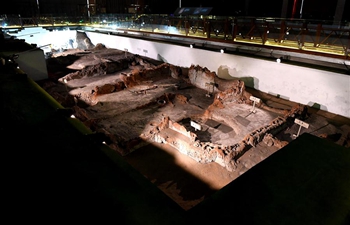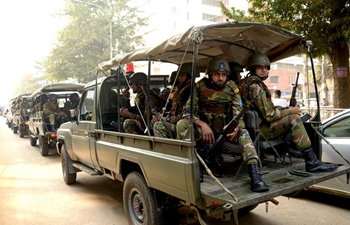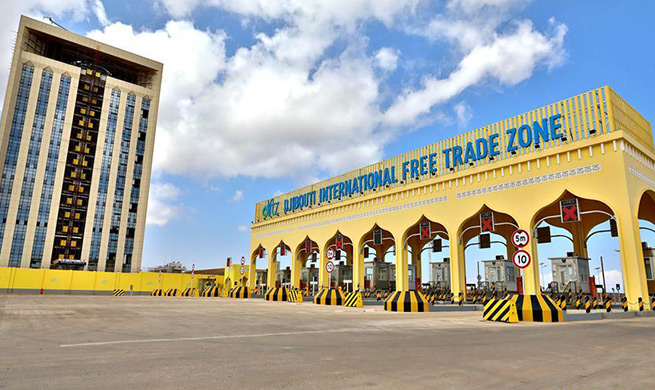by Hu Yao
MACAO, Dec. 28 (Xinhua) -- The Chinese mainland and Macao have stepped up their cooperation on disaster prevention and relief work after typhoon Hato and typhoon Mangkhut hit the region in two consecutive years, helping the latter strengthen its capability to deal with natural disasters.
Powerful Typhoon Hato struck the Macao Special Administrative Region (SAR) on Aug. 23, 2017, resulting in the deaths of 10 people and injuries of more than 244 others, with a heavy loss of 11.5 billion patacas (about 1.42 billion U.S. dollars).
Typhoon Mangkhut struck the Macao SAR on Sept. 16, 2018, injuring 15 people, with a loss of 1.55 billion patacas (about 192 million U.S. dollars).
At the invitation of Macao SAR Chief Executive Chui Sai On, the National Commission for Disaster Reduction has sent teams of experts to the Macao SAR for dozens of times in the past year in a bid to help review and provide suggestions on Macao's disaster prevention and relief work.
The teams were divided into groups based on their specialities, such as architecture, water conservation, meteorology, telecommunication, electricity, disaster prevention and rescue.
At the end of March this year, a report written by the experts was published on assessing the overall impact of Typhoon Hato and offering suggestions for optimizing the mechanism for managing emergencies in the Macao SAR.
The report also offered practical advice on measures appropriate to the Macao SAR in relation to the prevention or mitigation of disasters, post-disaster relief measures, and the SAR's response mechanism for any public emergency.
Meanwhile, the government of the Macao SAR also enhanced its cooperation with Tsinghua University, North China University of Technology, and the Ministry of Civil Affairs' National Disaster Reduction Center.
Based on the report and the suggestions by the experts, the government of the Macao SAR stepped up its efforts on infrastructure construction, upgrading its disaster monitoring and early warning system, and improving people's awareness of disaster prevention and relief. It also enhanced its abilities of electricity and water supply, as well as flood controlling at the inner harbor.
On Sept. 16 this year, Typhoon Mangkhut struck the Macao SAR. The SAR government was well-prepared before the typhoon came, with multiple measures put in place.
The Marine and Water Bureau warned all ports and ships to be alert about the coming storm and operate with caution. Secretary for Security Wong Sio Chak urged a 29-member civil protection management team and other public departments to pay particular attention to the preparations for the typhoon.
All departments of the SAR government took emergency plans to fight the powerful typhoon. People living in the areas near the sea were evacuated beforehand in case of floods caused by the typhoon.
Fortunately, all of the preparation work proved effective. There were only 15 people getting injured during typhoon Mangkhut, and the electricity and water supply remained normal.
Chief Executive of the Macao SAR Chui Sai On said in his Policy Address for the Fiscal Year 2018 that with the assistance of the experts from the National Commission for Disaster Reduction, the SAR government has strengthened its infrastructure construction, put into priority the life and property security of its residents, and enhanced its disaster prevention and relief work.
He said that the SAR government will enhance its planning for infrastructure construction, such as underground pipelines and windproof design for high buildings. It will also set up an information publishing platform, and train more meteorological personnel.
The SAR government will also seek to strengthen its cooperation with the mainland on disaster prevention and relief work, Chui added.
The SAR government is stepping up its efforts to advance Macao's overall capabilities for disaster prevention and mitigation, including amendment to the Civil Protection Law, the formulation of a 10-year plan for disaster prevention and mitigation (2019-2028), and the establishment of a new emergency command system.
The government will also strive to initiate an insurance system covering losses from major disasters, an overall emergency response plan, the construction of major fundamental infrastructure, and promotion of safety awareness of the public.

















